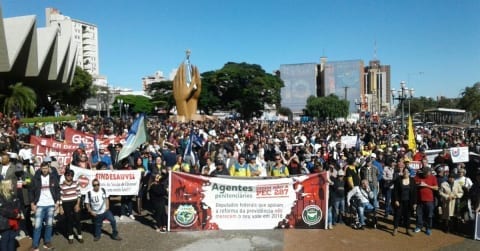Workers across Brazil launched a 24-hour general strike today, sparked by proposed legislation that would weaken labor regulations and force many Brazilians to work years longer before drawing a pension. Workers are protesting the government’s plans to remove all restrictions on outsourcing, impose drastic cuts on pensions, salaries and social security and dismantle labor rights, including provisions on vacations, overtime and working hours.

Workers protest pension cuts with signs saying, “No one should have to work until they die death.” Credit: CUT
“A small cabal of immensely wealthy business people are the only beneficiaries of what is in effect a scorched-earth economic policy involving a huge transfer of wealth to Brazil’s oligarchs,” says Sharan Burrow, general secretary of the International Trade Union Confederation (ITUC).
More than 14 million Brazilians are unemployed and the country is in recession, even as nearly a third of President Michel Temer’s cabinet and congressional allies are under investigation, part of a widening corruption scandal that has revealed massive levels of graft at the top of government.
“We are making the biggest general strike in Brazil’s recent history to respond to the biggest attack on social, labor and social security rights that the working class has suffered,” says Claudir Nespolo, president of the Central Workers Union (CUT) in Rio Grande do Sul. CUT is Brazil’s biggest labor confederation and one of several federations that spearheaded the strike.
Unions and their members shut down the subway, train and bus in Sao Paulo, Brasilia, Salvador and Recife, and have partially paralyzed public transport in other major cities like Belo Horizonte and Rio.
Workers, Unions Targeted in Proposed Laws
Public transport staff, bankers, teachers and hundreds of thousands of other workers took to the streets two days after the lower house of Congress passed reforms Wednesday to reduce labor costs and erode the power of unions. The legislation is now in the Senate.
Luiza Batista, president of the National federation of Domestic Workers in Brazil, says the new labor reforms “will be awful” for domestic workers.
“A worker may have a contract with an employer that requires her an hour of work a day, or two hours a day, and her salary will not pay anything,” says Batista. “Employers take advantage of the workers’ needs, knowing their difficulties, to offer inhuman wages and hours of work.”
CUT President Vagner Freitas says the drastic cuts to worker rights are not about saving money but rather an attempt to weaken the trade union movement.
What the government wants to do is ensure “workers do not have a formal contract, so they do not have a clear and legal professional category and therefore have difficulty having a union that protects them,” says Freitas.
Next week, a special congressional commission is due to begin voting on a constitutional amendment that would overhaul the pension system. A survey published last month found that 72 percent of Brazilians opposed the pension reform.

